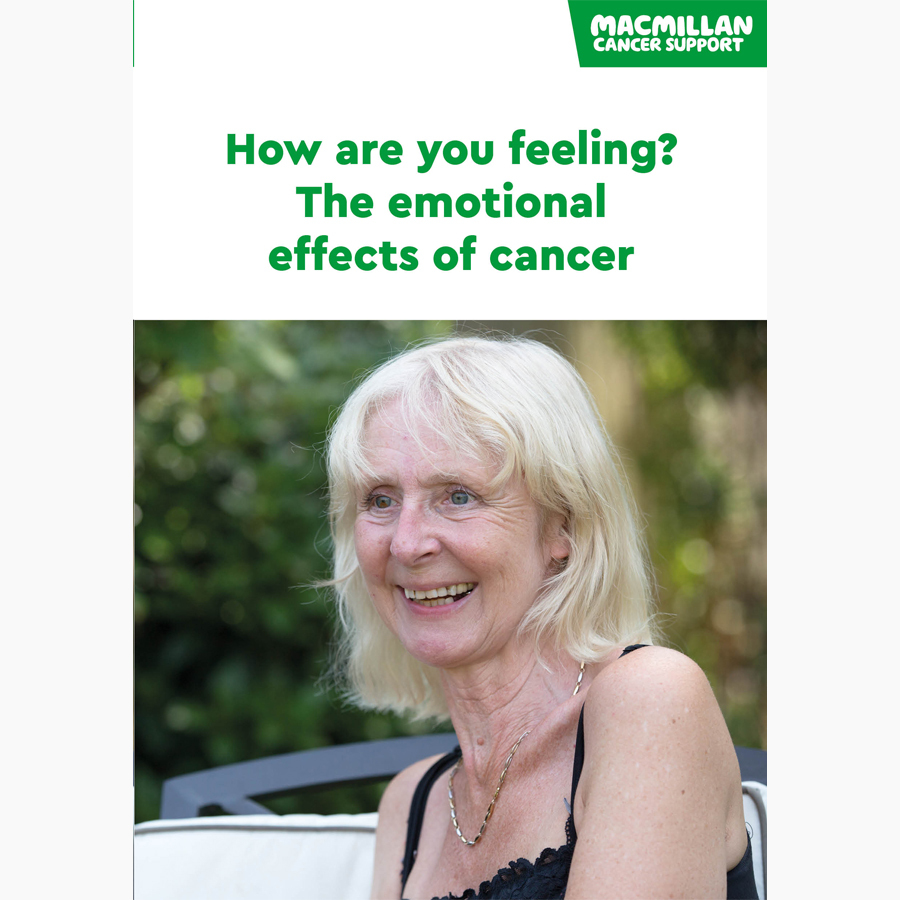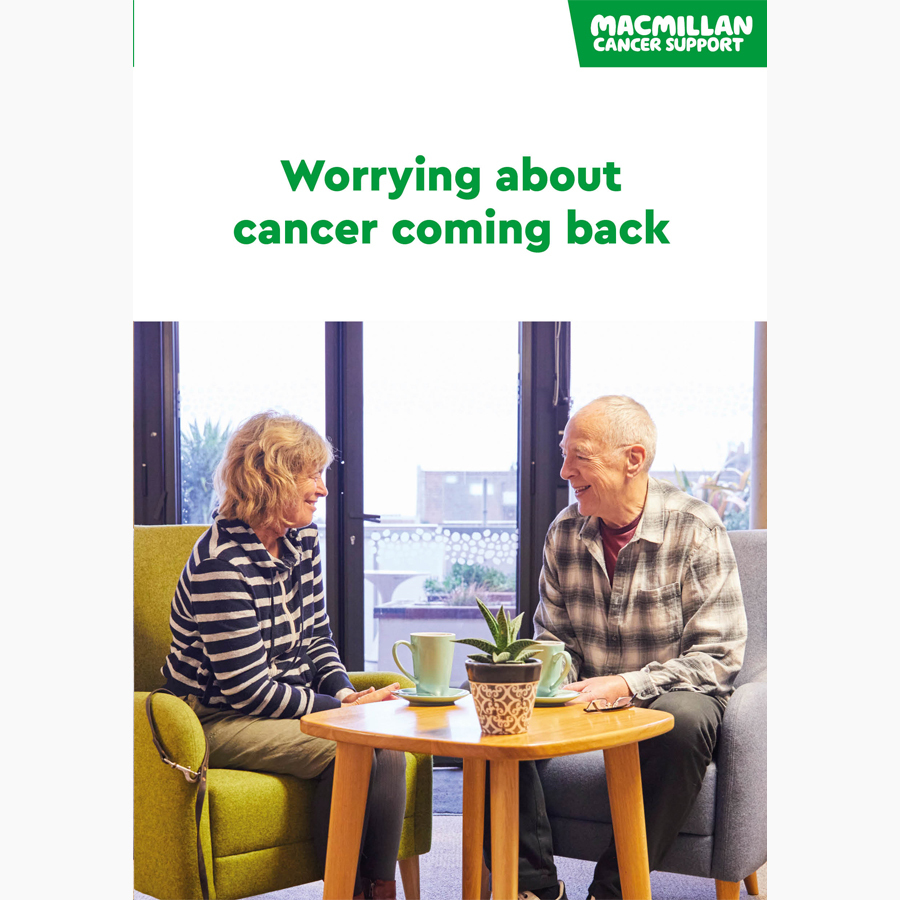Uncertainty and cancer
It is normal to feel uncertain about your future when you have been diagnosed with cancer. There are ways that you can help manage these feelings.
Understanding uncertainty
We all like to know what is going to happen to us. It helps us feel secure about the future. Your feelings can change when you are told you have cancer.
You might be worried about how cancer treatment will affect you. You might be anxious about whether it will work. Your future may feel uncertain, and this can be frightening.
You may find yourself asking some of these questions:
- What happens now?
- How will I feel during my treatment?
- Will I ever get back to how I was before?
- Will I be able to go back to work after treatment?
- Will I be able to get pregnant or get someone pregnant?
- Will the cancer come back? If so, when?
Uncertainty can be stressful. You might find it difficult to make plans when you are not sure about the future.
Booklets and resources
Coping with uncertainty
If you are finding uncertainty hard to live with, try taking control of the things you can do something about. Getting back into a routine will help. Over time, you will be able to do more of your usual activities.
You might decide to make changes to your diet or other areas of your life. You may want to try complementary therapies to help you relax and cope with stress.
You may find it helpful to know that other people have the same kinds of feelings as you. Visit our Online Community to talk with people who are dealing with cancer and share your experience. Our website can help you find local support groups.
It can help to know these feelings of worry and uncertainty are normal. You may always have some of these feelings after a cancer diagnosis. This may be hard and can take time to accept. But there is help and support available.
It can be helpful to focus on what you can control right now. This can help you manage any concerns about what might happen in the future. It can include:
- talking about your feelings
- getting support
- being involved in your own health and well-being
- following advice from your healthcare team
- knowing when you need help and where to get it.
Some of these suggestions may not work for you. There are no right or wrong ways to cope.
Getting support
Macmillan is also here to support you. If you would like to talk, you can do the following:
- Call the Macmillan Support Line for free on 0808 808 00 00.
- Chat to our specialists online.
- Visit our emotional support forum to talk with people who are dealing with anger and frustration, share your experience, and ask an expert your questions.
Worrying about cancer coming back
You might feel relieved when you finish cancer treatment. But you may also worry whether treatment has worked and what might happen in the future.
Sometimes the aim of treatment is to cure the cancer. But doctors may not use the word cure. This is because some cancers do come back. Everyone’s cancer and treatment is different. Sometimes treatment may get the cancer under control, but doctors know it may come back in the future.
Most people who have been through cancer treatment live with some worry and uncertainty. This does not mean they are not coping with life after treatment.
Some people find it hard to cope with uncertainty. They can feel as if they have very little control over their lives. But these feelings can get better over time.
Taking control
Learning about the cancer and its treatment can make you feel more in control. It can help you understand your condition and make decisions. It can also help you feel more involved in your care.
Having the right information can help when you speak with your cancer doctor, family, friends or work colleagues. Telling people what you really think and feel helps them understand what is important to you.
Some people want a lot of information. Others may only want to know the basic facts and prefer to leave the details to their doctor. Tell your cancer team what you prefer. Everyone has their own ways of coping. It is okay to do what is best for you.
Getting the right information
There is a lot of information available online, in print and shared on social media. Some of this information can be wrong or misleading. This is called misinformation.
There are a lot of incorrect beliefs about cancer and cancer treatment. It is important to get information that comes from a source you can trust and is up to date.
Ask your specialist nurse or cancer doctor where to find the best information. If you are not sure whether something you have read is reliable, check with your nurse or doctor. They are in the best position to answer your questions because they know about your situation.
When you are reading information, whether online or in print, it can help to look for the Patient Information Forum (PIF) tick:
The PIF tick means that the information is based on up-to-date evidence and follows strict guidelines.
Some health information videos on YouTube also have a blue panel beneath the video. These panels are applied to videos that have been identified as reliable sources of information.
For example, videos from the NHS have the following blue panel beneath them:
We have information in a range of formats about cancer, cancer treatments and living with cancer. You can order our information by visiting Macmillan Orders or by calling our cancer support specialists on 0808 808 00 00.
You can also go to a local Macmillan Information and Support Centre to talk to experts and trained volunteers. They can give you support and answer your questions. You can search for groups or Information and Support Centres near you.
Related pages
Making sense of statistics
Statistics about cancer can be difficult to understand. If you want to know more about the chances of the cancer coming back, talk to your specialist nurse or cancer doctor. They may be able to give you statistics about it.
Statistics about surviving cancer are based on large numbers of people. Everyone is different, so statistics cannot predict what will happen to you as an individual. Your situation may be different from other people’s situations.
Although doctors cannot predict exactly what will happen to you, they may be able to give you some general facts. They will base this on:
- the stage of the cancer
- how the type of cancer you have usually behaves
- the treatments you have had
- the evidence they have available to them.
If you read any statistics that worry you or you cannot understand, talk to your cancer doctor or specialist nurse.
We have more information about understanding statistics.
Related pages
Booklets and resources
Looking ahead
Your worries about the cancer coming back may never go away completely. At times, it may feel overwhelming. It is important to talk to someone if you feel like this. It is still possible to live a full life with the right help and support.
Going back to work or starting to do the things you did before are important steps forward. We have more information about work and cancer.
Having cancer can lead to positive life changes. Sometimes it can focus your mind on what is important to you. This can include spending more time with the people you care about or making time for the things you have always wanted to do.
Having plans can help move your focus away from the cancer. Doing something new can help distract and relax you. Some hobbies help you express your feelings – for example, learning to play a musical instrument or painting.
You may decide to be more active. For example, you may start cycling, doing yoga, dancing or join a walking group. You do not have to be good at these activities to enjoy them. Look out for any groups or classes in your area. Find something you enjoy and feel comfortable with.
When you feel ready, you may decide to do some volunteer work. You could try to find something that matters to you or makes you feel part of your community.
These are all different ways to help you feel you are moving forward.
Related pages
About our information
This information has been written, revised and edited by Macmillan Cancer Support’s Cancer Information Development team. It has been reviewed by expert medical and health professionals and people living with cancer.
-
References
Below is a sample of the sources used in our diagnosis and staging information. If you would like more information about the sources we use, please contact us at cancerinformationteam@macmillan.org.uk
Common mental health problems: identification and pathways to care. Clinical guideline [CG123]. Published: May 2011. Available from: www.nice.org.uk/guidance/cg123 (accessed November 2022).
Depression in adults: treatment and management. NICE guideline [NG222]. Published: June 2022. Available from: www.nice.org.uk/guidance/ng222 (accessed November 2022).
Maheu C, Singh M, Lam Tock W, Eyrenci A, Galica J, Hébert M, Frati F and Estapé T. Fear of Cancer Recurrence, Health Anxiety, Worry, and Uncertainty: A Scoping Review About Their Conceptualization and Measurement Within Breast Cancer Survivorship Research. Front. Psychol., 12 April 2021. Sec. Psycho-Oncology. Available from: www.doi.org/10.3389/fpsyg.2021.644932 (accessed November 2022).
Date reviewed

Our cancer information meets the PIF TICK quality mark.
This means it is easy to use, up-to-date and based on the latest evidence. Learn more about how we produce our information.
The language we use
We want everyone affected by cancer to feel our information is written for them.
We want our information to be as clear as possible. To do this, we try to:
- use plain English
- explain medical words
- use short sentences
- use illustrations to explain text
- structure the information clearly
- make sure important points are clear.
We use gender-inclusive language and talk to our readers as ‘you’ so that everyone feels included. Where clinically necessary we use the terms ‘men’ and ‘women’ or ‘male’ and ‘female’. For example, we do so when talking about parts of the body or mentioning statistics or research about who is affected.
You can read more about how we produce our information here.






